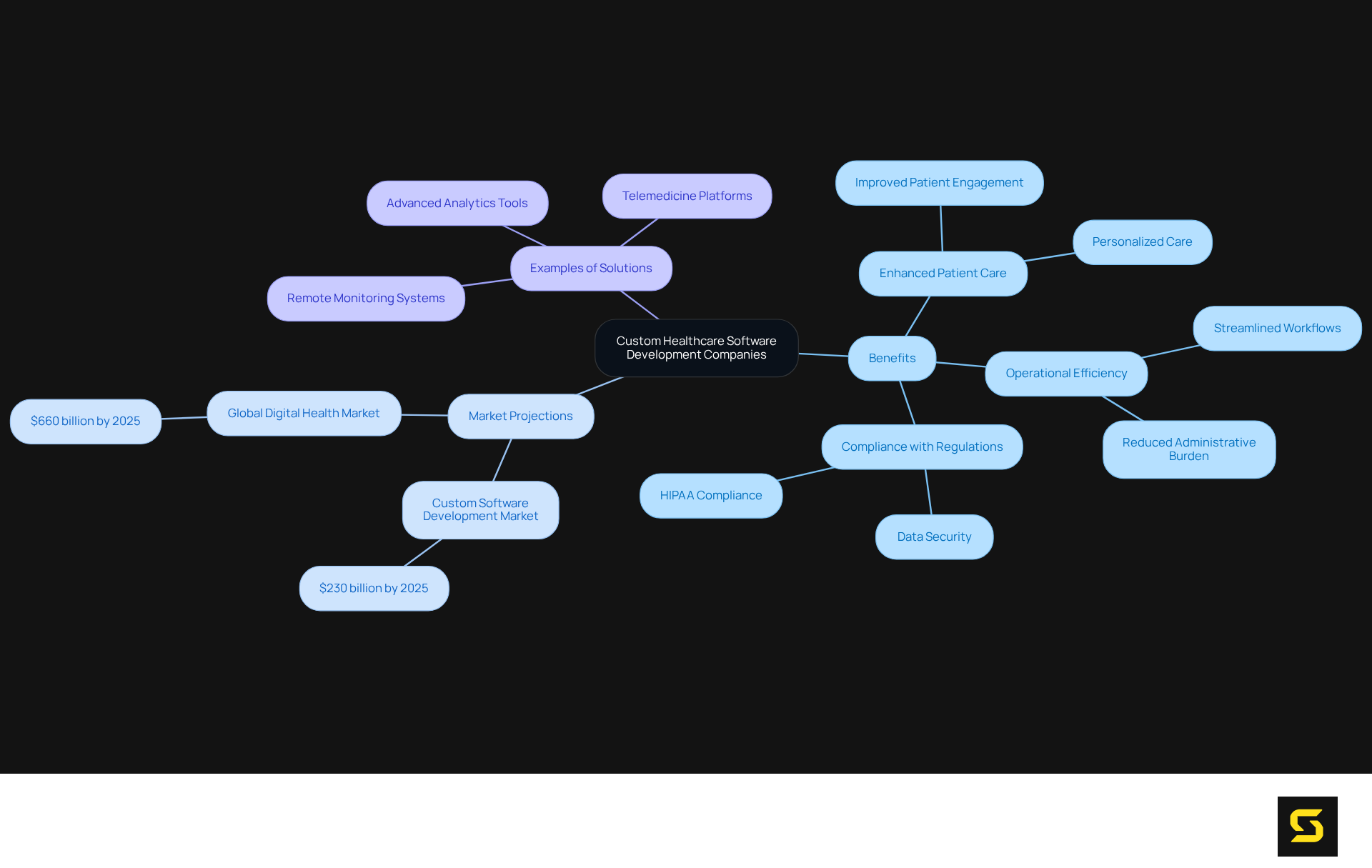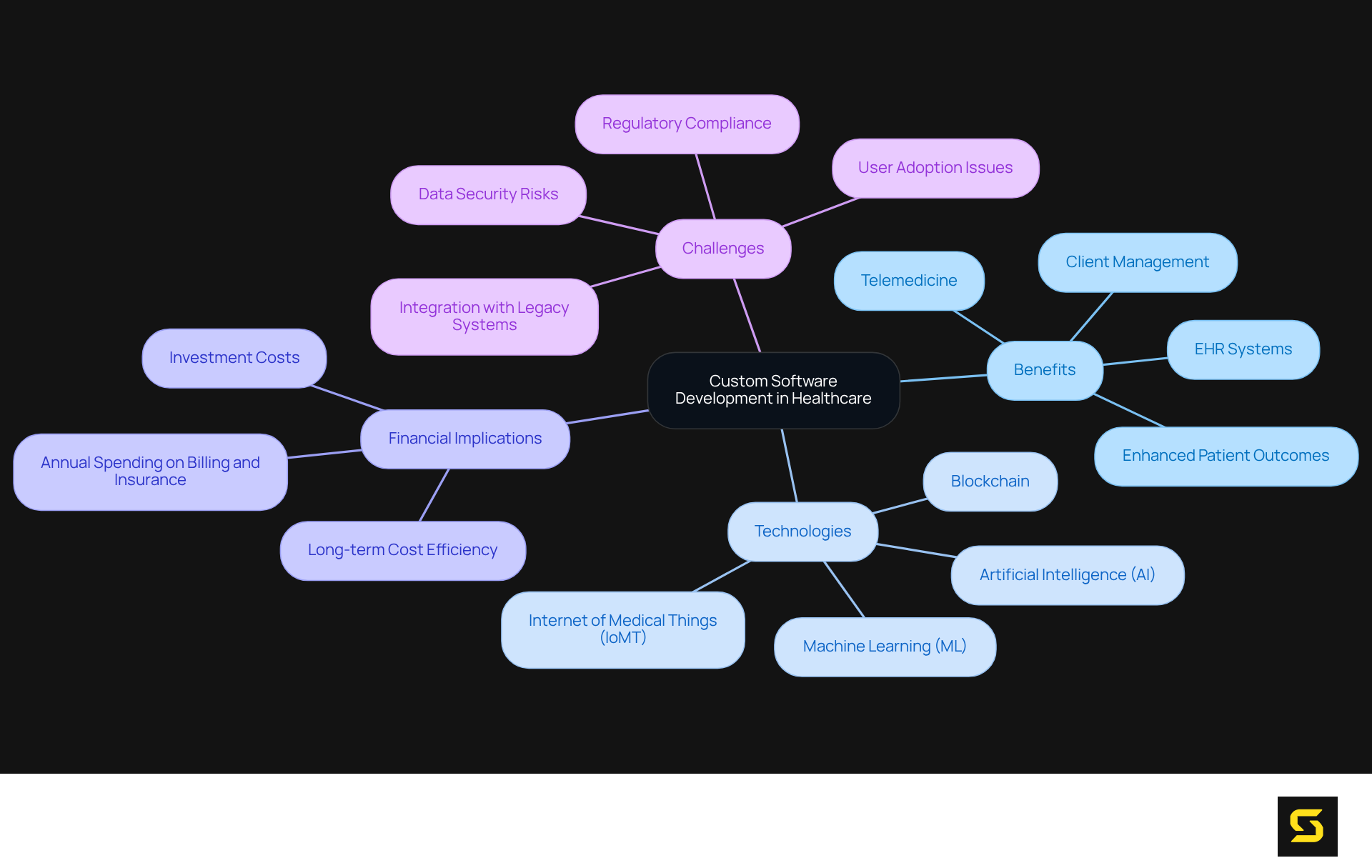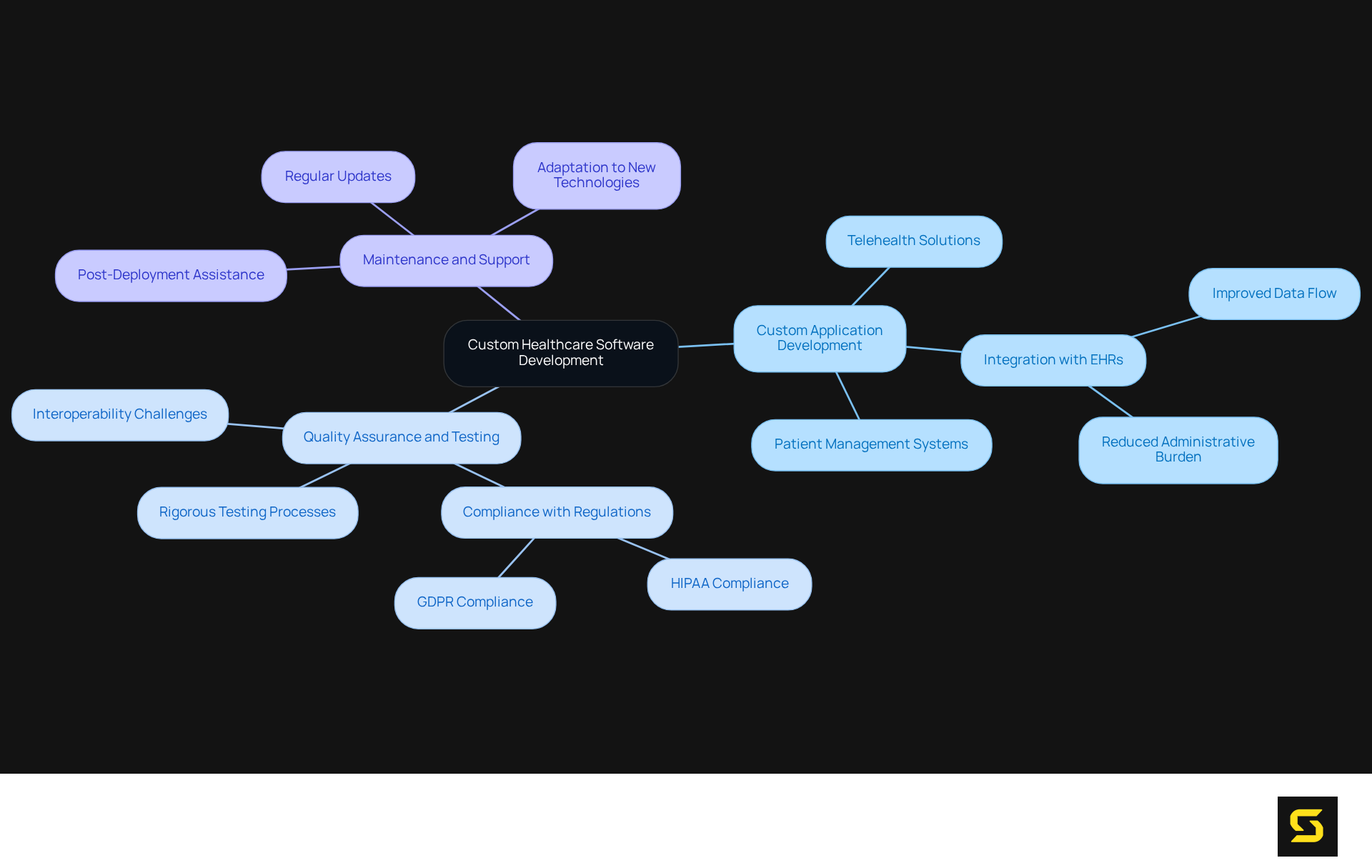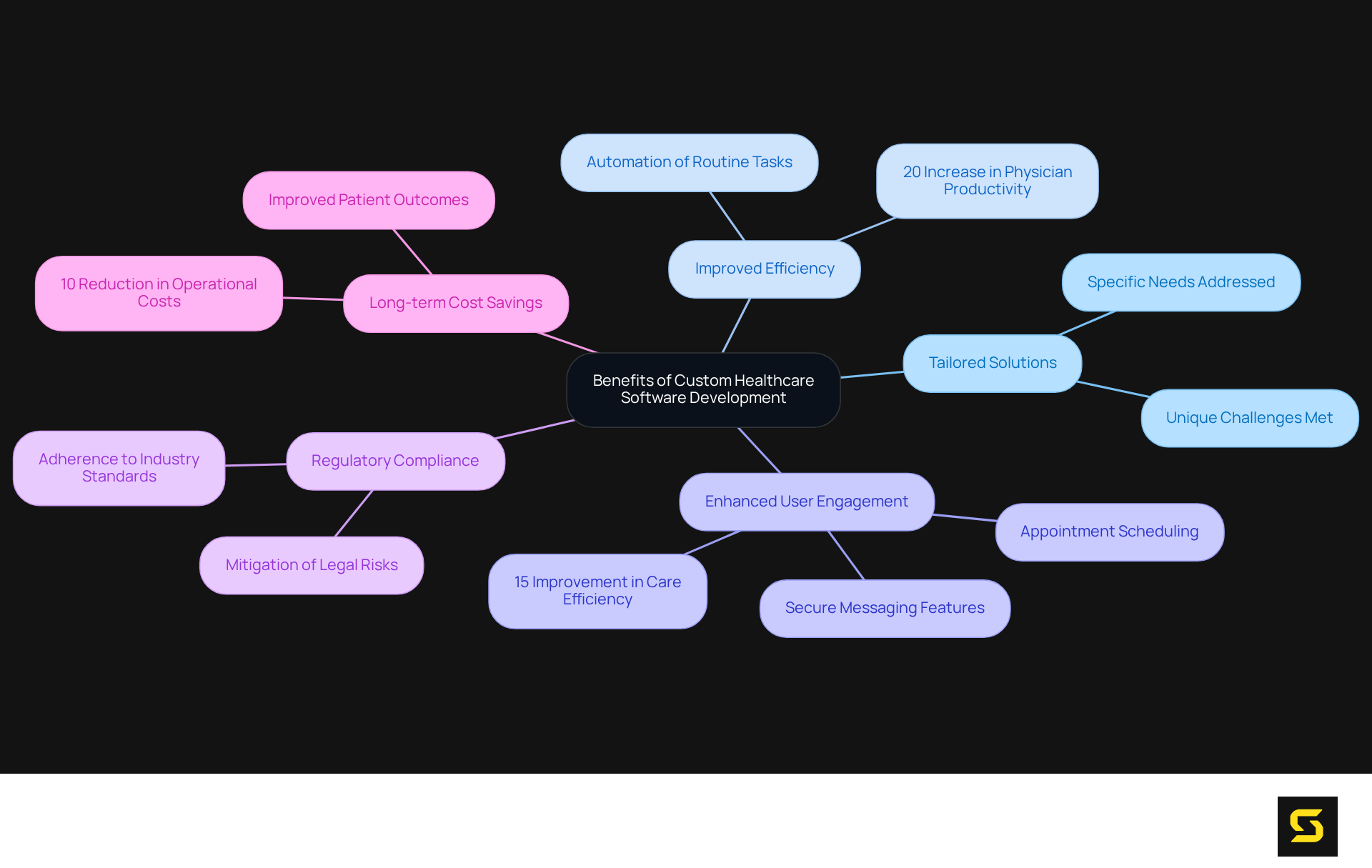Overview
Custom healthcare software development companies excel in crafting personalized software solutions specifically designed for the unique needs of medical organizations. This specialization significantly enhances patient care and boosts operational efficiency. By providing bespoke applications, these companies streamline workflows, ensure regulatory compliance, and leverage advanced technologies. The result? Improved health outcomes and reduced operational costs. Such capabilities not only demonstrate the value of these services but also establish a clear path for medical organizations to elevate their operational standards and patient care. Engage with a custom software development partner to transform your healthcare delivery today.
Introduction
Custom healthcare software development companies are leading the charge in transforming the medical landscape, crafting bespoke solutions that address the unique needs of healthcare providers. With the surging demand for tailored applications, these companies not only enhance patient care and operational efficiency but also ensure compliance with stringent regulations.
However, in the face of rapid technological advancements and the complexities of healthcare systems, how can organizations effectively navigate the challenges of integrating customized software while maximizing their benefits? The answer lies in strategic planning and execution.
Defining Custom Healthcare Software Development Companies
Custom healthcare software development companies are dedicated to crafting personalized solutions specifically designed to meet the distinct requirements of medical organizations. A custom healthcare software development company focuses on creating applications that enhance patient care, streamline operations, and ensure compliance with industry regulations such as HIPAA. In contrast to off-the-shelf applications, which may fall short in addressing specific needs, a custom healthcare software development company meticulously develops tailored solutions from the ground up to align seamlessly with the workflows and strategic objectives of medical providers. This by a custom healthcare software development company fosters enhanced flexibility, scalability, and integration with existing systems, ultimately leading to improved outcomes for patients and increased operational efficiency.
The custom medical application development market is projected to surpass $230 billion by 2025, underscoring a growing demand for personalized and adaptable solutions. Moreover, the global digital health market is anticipated to reach $660 billion by 2025, reflecting the expansive growth of the industry. Experts emphasize that investing in tailored applications not only positions medical organizations ahead of their competitors but also ensures a future-ready system that prioritizes well-being and operational excellence. As Neil Hodgson-Coyle articulates, "By investing in tailored applications, healthcare organizations can not only remain ahead of the competition but also guarantee a future-ready system that emphasizes individual well-being and excellence in operations."
Examples of customized software solutions encompass:
- Remote monitoring systems utilizing IoMT devices for real-time health data collection
- Telemedicine platforms facilitating virtual consultations
- Advanced analytics tools providing insights into care and operational performance
Notably, remote monitoring solutions have demonstrated their effectiveness in enhancing outcomes and reducing hospital readmissions. These advancements are crucial for addressing the unique challenges faced by medical organizations, ultimately leading to improved care management and better health results. Furthermore, tailored solutions prioritize data security and compliance, ensuring adherence to HIPAA standards and safeguarding sensitive information. The medical IT market is also projected to grow from $360 billion in 2024 to over $730 billion by 2029, highlighting the increasing reliance on technology in the medical field.

The Role of Custom Software Development in Healthcare
In the medical field, a custom healthcare software development company is essential for bespoke application development, effectively tackling challenges such as data management, user engagement, and regulatory compliance. Customized solutions provided by a custom healthcare software development company, including electronic health record (EHR) systems, telemedicine platforms, and client management software, significantly enhance the efficiency of medical service delivery.
These systems empower medical professionals to securely manage client information, foster seamless communication between clients and providers, and streamline administrative tasks. Notably, the has surged, with over 68% of medical providers worldwide leveraging new digital platforms to elevate care quality and operational efficiency. Additionally, more than half of U.S. individuals report increased satisfaction with their care due to telehealth services, underscoring the positive impact of these technologies on patient experiences.
Furthermore, bespoke applications can harness advanced technologies such as artificial intelligence (AI) and machine learning (ML) to refine diagnostics and treatment strategies. AI is rapidly transforming the medical landscape by enabling predictive analytics, personalized treatment recommendations, and enhanced diagnostic accuracy. As the medical sector evolves, integrating these technologies will be pivotal in shaping the future of patient care, with 2025 set to usher in a new era of innovation driven by advancements in application development.
However, it is crucial to acknowledge the substantial financial implications of medical application development, especially for a custom healthcare software development company, as U.S. payers and providers collectively invest approximately $496 billion annually on billing and insurance costs. Moreover, challenges such as data security risks and complex integration with legacy systems must be addressed to fully realize the benefits of tailored solutions.

Key Services and Features of Custom Healthcare Software Development
Key services offered by a custom healthcare software development company are essential for enhancing medical delivery and operational effectiveness. These services include:
- Custom Application Development: Tailored applications that address specific healthcare needs, such as patient management systems and telehealth solutions, are vital for improving patient engagement and care continuity.
The seamless incorporation of new technological solutions with existing systems, including Electronic Health Records (EHRs) and billing applications, is crucial for a custom healthcare software development company. By 2025, organizations prioritizing integration are projected to experience significant enhancements in operational efficiency, with many reporting a 150-400% return on investment within three years due to improved data flow and reduced administrative burdens. Notably, EHR integration alone has the potential to save $30 billion annually through enhanced interoperability.
- Quality Assurance and Testing: A custom healthcare software development company employs rigorous testing processes to ensure that the software is reliable, secure, and compliant with medical regulations. This is particularly important as medical organizations face increasing scrutiny regarding data security and adherence to standards such as HIPAA and GDPR. Furthermore, 63% of medical executives identify interoperability and integration as their largest barrier to achieving digital transformation objectives, which emphasizes the urgent need for a custom healthcare software development company to tackle these challenges.
- Maintenance and Support: Continuous assistance from a custom healthcare software development company is essential for resolving any issues that arise post-deployment, ensuring that the application remains aligned with the evolving requirements of medical providers. This includes regular updates and enhancements to adapt to .
Collectively, these characteristics enhance the functionality and usability of medical applications, making them crucial resources for a custom healthcare software development company that aims to improve patient care and operational efficiency. Industry professionals assert that effective integration not only streamlines workflows but also significantly mitigates the risk of medical errors, with EHR integration alone capable of reducing such errors by up to 40%. Additionally, effective integration strategies have demonstrated a 20% decrease in hospital-acquired infections, highlighting the critical importance of robust data management in the medical field.

Benefits of Engaging with a Custom Healthcare Software Development Company
Engaging with a custom healthcare software development company presents a wealth of advantages, including:
- Tailored Solutions: Custom software is meticulously designed to meet the specific needs of healthcare providers, effectively addressing unique challenges within the industry.
- Improved Efficiency: By automating routine tasks and streamlining workflows, custom software significantly boosts operational efficiency. The case study titled "Revolutionizing Healthcare with Telemedicine Platform" illustrates how a generative AI-powered healthcare management system increased physician productivity by 20%, enabling healthcare professionals to devote more time to patient care.
- Enhanced User Engagement: Tailored solutions often incorporate features such as secure messaging, appointment scheduling, and access to health records. This results in heightened patient satisfaction; statistics reveal that can improve overall care efficiency by 15%, as evidenced by the AI-powered system that expedited diagnoses.
- Regulatory Compliance: Custom applications prioritize compliance, ensuring that medical organizations adhere to industry regulations and standards, thereby mitigating the risk of legal complications. This focus is essential for maintaining functional integrity within the healthcare sector.
- Long-term Cost Savings: Although the initial investment in tailored programs may exceed that of off-the-shelf options, the long-term benefits—including reduced operational costs and improved patient outcomes—often justify the expense. Organizations utilizing customized applications have reported a 10% decrease in operational costs due to enhanced efficiency.
These advantages underscore the importance of custom healthcare software development company as a strategic investment for organizations seeking to innovate and thrive in the rapidly evolving digital landscape.

Conclusion
Custom healthcare software development companies play a pivotal role in revolutionizing the medical landscape by delivering bespoke solutions tailored to the unique demands of healthcare providers. By focusing on the specific needs of medical organizations, these companies create applications that enhance patient care, streamline operations, and ensure compliance with stringent industry regulations. This customized approach not only fosters improved flexibility and scalability but also leads to significant advancements in operational efficiency and patient outcomes.
The substantial growth projected in the custom healthcare software market underscores the increasing reliance on technology in healthcare. Various types of solutions are offered, including:
- Telemedicine platforms
- Electronic health record systems
- Advanced analytics tools
Additionally, the challenges involved in developing these tailored applications—such as:
- Data security
- Integration with existing systems
- The importance of ongoing support and maintenance
are crucial considerations that must be addressed.
Investing in custom healthcare software is essential, as it empowers medical organizations to stay ahead of the competition while prioritizing patient well-being and operational excellence. As the healthcare industry continues to evolve, embracing tailored software solutions will be vital for improving care delivery and achieving long-term success. Organizations are encouraged to explore the potential of custom software development, ensuring they are well-equipped to navigate the complexities of modern healthcare and enhance the overall quality of patient care.
Frequently Asked Questions
What are custom healthcare software development companies?
Custom healthcare software development companies specialize in creating personalized software solutions tailored to meet the specific needs of medical organizations, focusing on enhancing patient care, streamlining operations, and ensuring compliance with industry regulations like HIPAA.
How do custom healthcare software solutions differ from off-the-shelf applications?
Unlike off-the-shelf applications that may not fully address specific needs, custom healthcare software solutions are developed from the ground up to align with the unique workflows and strategic objectives of medical providers, offering enhanced flexibility, scalability, and integration with existing systems.
What is the projected market growth for custom medical application development?
The custom medical application development market is projected to exceed $230 billion by 2025, indicating a growing demand for personalized and adaptable healthcare solutions.
What are some examples of customized software solutions in healthcare?
Examples of customized software solutions include remote monitoring systems using IoMT devices for real-time health data collection, telemedicine platforms for virtual consultations, and advanced analytics tools that provide insights into care and operational performance.
How do remote monitoring solutions benefit healthcare organizations?
Remote monitoring solutions have proven effective in enhancing patient outcomes and reducing hospital readmissions, addressing unique challenges faced by medical organizations and improving care management.
Why is data security important in custom healthcare software development?
Tailored solutions prioritize data security and compliance to ensure adherence to HIPAA standards, safeguarding sensitive information and maintaining the trust of patients and healthcare providers.
What is the projected growth of the medical IT market?
The medical IT market is expected to grow from $360 billion in 2024 to over $730 billion by 2029, highlighting the increasing reliance on technology within the medical field.





